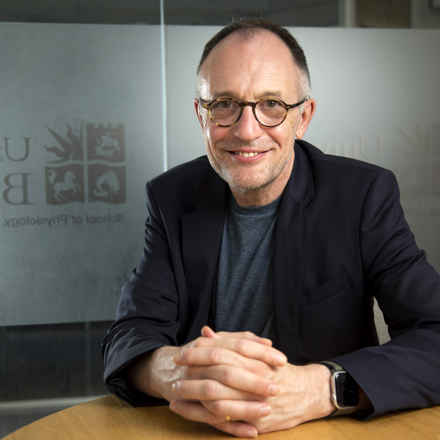What would it really take to end macular disease? Professor Andrew Dick reveals all
Posted: Friday 29 October 2021
For more than 30 years, Professor Andrew Dick has been investigating what happens when the immune system goes wrong – and since 2012, his lab has been focused on age-related macular degeneration (AMD).
We asked him what excites him about his work, and what it would really take to end macular disease. And one of our members Margaret, who has shared her story as part of our Christmas appeal, brought her own questions too.
In a nutshell, what are you working on?
Wherever they are in the body, all cells need to defend themselves from damage. But an exaggerated response from the immune system can cause more harm than it prevents. In the eye, that leads to damage to the retina, and eventually to sight loss.
I want to understand the triggers that cause this overreaction and send systems out of balance – and from there, develop the therapies and treatments to correct them.
Margaret: So what kind of macular disease would that help with?
To begin with, the slow-acting form of AMD (usually called ‘dry’). It’s by far the most common type of macular disease. And as you know, there’s no cure, and no treatment, so there’s a huge need.
Why is this an exciting time to work in macular disease
We have a greater understanding of cells and their function than ever before. Each year, we understand more about what’s happening at a molecular and genetic level. And the high-quality images we can take of different levels of the retina are just incredible compared with a few years ago.
We can now spot signs of macular disease long before people notice their sight changing, and find out much more quickly if a treatment is working.
Margaret: How near are we to a treatment being discovered?
Our knowledge is advancing so rapidly at the moment: I believe that in five years’ time, we won’t just be talking about two types of AMD.
Thanks to many years of cancer research, we now understand how different cancers develop and grow at a molecular level. So doctors no longer just talk about one type of ‘breast cancer’, or treat all types with the same drugs or therapies – they can tailor treatment to each specific type of breast cancer.
In the same way, we’ll soon understand all the different ways that macular disease can develop, how quickly each one leads to sight loss, and the treatments that work best for each type.
Margaret: Has macular disease research suffered because it’s seen as ‘an older people’s condition’
Until relatively recently, I don’t think the average person understood how frightening and worrying it is to be told you are losing your sight – and to have no idea how long that might take.
But the longer it takes, the more people will lose their sight unnecessarily. That’s why it’s so urgent to fund research like the Macular Society does.
How did the coronavirus pandemic affect your work?
I think the pandemic has made research more visible. So many people volunteered for anti-coronavirus drug and vaccine trials because they wanted to see change, and to be part of it. It was quite amazing.
While the pandemic did cause some delays to our work, we’re up and running again now, and people definitely want to be part of the solution.
The goodwill of the public, and their faith in research, is enormous.
What are the challenges of researching macular disease?
Compared to diseases that affect other parts of the body, it’s very difficult to collect tissue samples and examine what’s happening at the back of the eye. And money, of course.
The last couple of years have shown us just how rapid progress can be when the will, and the funds, are there. People are just starting to see what a huge public health issue AMD is, and the technology is there: in a few years you’ll be able to use your smartphone camera to monitor the back of your eye.
What we need are the funds to collect and analyse millions more high-quality images, so it has nowhere left to hide.
The secrets of macular disease, and the keys to beating it, are ready to be exposed.
You can help researchers like Professor Dick put a stop to macular disease once and for all. We have all waited long enough.
What role does our immune response play in AMD?
Professor Andrew Dick discusses his latest research looking at the link between our immune response and AMD.
Explore our research
Beating macular disease through funding medical research and improving the lives of those living with macular disease.




